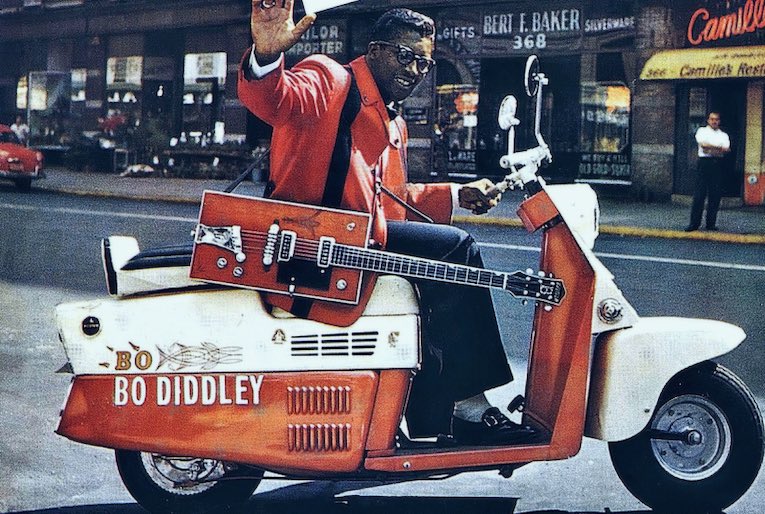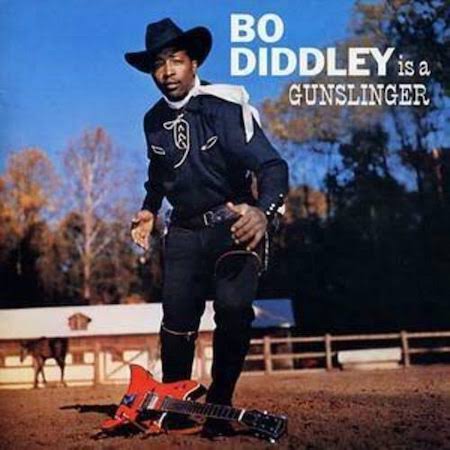
Bo Diddley
By Jay Luster
“I opened the door for a lot of people, and they just ran through and left me holding the knob.” Bo Diddley
In the spring of 1955, rock and roll was still in the earliest stages of its takeover of the music industry. With the replacement of the 78 rpm shellac discs by the vinyl 45 a few years earlier, the industry had a durable product they believed could fuel a recorded music sales boom for their companies. They weren’t wrong. Bill Haley And His Comets led the way with 1954’s biggest hit Rock Around The Clock, and nearly overnight, retailers couldn’t keep enough of the seven-inch records with the weird sized hole in the middle on their shelves.
With musicians like Ray Charles and Fats Domino pointing the way forward, the growing teenage consumer feeding frenzy for the freshly pressed 45 rpm disks seemed to have no limits. Sam Phillips, the producer at Sun Records had already released music by rock ribbed blues men, Howlin Wolf and BB King, and is quoted as saying, “If I could find a white boy who could sing like a black man I’d make a million dollars.” In 1954, when Elvis Presley had a huge hit with Arthur Crudup’s 1946 song, “That’s Alright,” Phillips’ assumption was proven correct. While the song helped make Elvis a star, it also cracked the door open to black rhythm and blues artists. Soon, guys like Chuck Berry kicked the door in with crossover hits like “Maybelline” and “Johnny B.Goode.”
Hot on the heels of Chuck Berry was another Chicago blues man named Ellias McDaniel and he was about to change the world.

McDaniel had come to Chicago by way of McComb, Mississippi and was signed by Checker Records, a subsidiary of the world-famous Chess Records. In the spring of 1955, history was made when McDaniel, and Checker released a single under McDaniel’s nickname, Bo Diddley. Diddley’s first song was also called “Bo Diddley.” It was a clever piece of marketing that helped propel an already game-changing song to the top of the charts. The song itself was wrapped in one of the most powerful, and catchy beats ever caught on tape, and it became universally known as the “Bo Diddley beat.” The song was initially marketed to the black R&B audience, but with its driving beat and mysterious lyrics, it muscled its way from the black R&B charts through the crossover door and sailed up the Hot 100. Its effect on teenage pop culture, during its time, and today, cannot be overstated.
So, what is the Bo Diddley beat? In technical terms, it is a 3-2 Clave, which is musical shorthand for a fusion of Caribbean and African rhythms, which possibly dates back as far, or perhaps beyond, Lionel Belasco’s, 1906 hit L’année Passée. While that song has a more Latin/Calypso vibe, than the rough and ready, Bo Diddley beat, it is undoubtedly a forebear of the mountain of hit songs generated by Elias McDaniel’s recorded magic. Eventually, a New Orleans artist, with the outstanding Star Wars name, Lord Invader wrote and recorded a song called Rum And Coca Cola.
A year later, in 1944, that song became a surprise worldwide sensation for the Andrews Sisters. With US troops serving in every combat theater of World War II, the ladies had used their stunning harmonies to narrate every GI’s perfect sexy weekend liberty pass. A few years later, another New Orleans artist, James “Sugar Boy” Crawford wrote and recorded a song called “Jock-o-Mo.” Sometimes called Iko-Iko, its charismatic spontaneity lit up the French Quarter bar rooms, and was another paving stone on the road merging musical cultures of black R&B, with the suburban appetite for rock and roll.
With Bo Diddley’s song rising up the charts, Ed Sullivan broke the color barrier by making him the first black performer to appear on his show. It was agreed ahead of time Diddley would play Tennessee Ernie Ford’s, “Sixteen Tons” instead of “Bo Diddley,” which was still considered “race music.” Once on stage, the show’s director flashed a cue card to the band that said, “Bo Diddley” on it. Diddley either took it to mean he had the go ahead to play his hit record, or he was just being defiant, but one way or the other, Sullivan believed he’d been crossed, and banned Diddley from the show. Another black milestone?
Throughout the years since 1955, the Bo Diddley beat would show up hundreds, if not thousands of times in pop music. While the list of songs is much too lengthy to recount here, a few of them would include “Not Fade Away” by Buddy Holly, “Faith” by George Michael, “She’s the One” by Bruce Springsteen, “Magic Bus” by The Who, and “American Girl” by Tom Petty. Whether it was saccharine garden party music like Ricky Nelsons’ “Be Bop Baby,” or George Thorogood’s sweaty stage stomping version of Bo Diddley’s very own “Who Do You Love,” one thing is for sure, Elias McDaniel, and his Gretsch Cigar Box guitars will always be remembered as one of the most significant, and influential artists of all time.
Happy 93’rd birthday Elias McDaniel (Bo Diddley)
December 30, 1928 to June 2, 2008

Interesting article! Knew about the Bo Diddley beat but never knew about the Ed Sullivan ban!